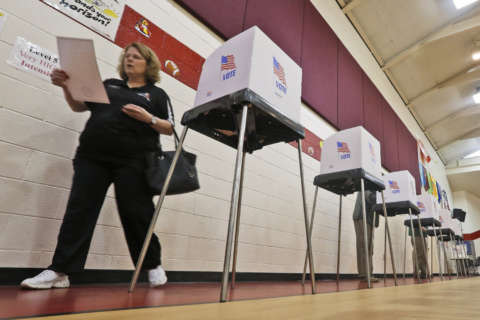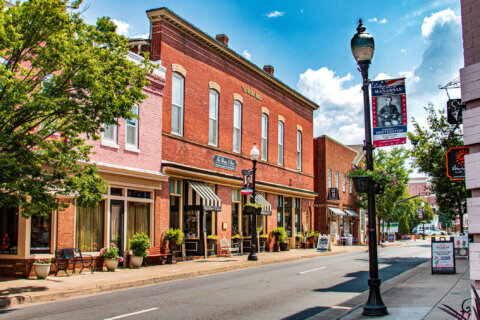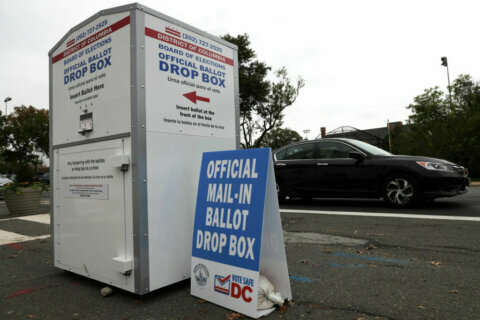Editor’s note: This is one in a series of pieces on the Nov. 6 midterm election. WTOP interviewed candidates in key contested local races. See all of WTOP’s coverage election coverage.
WASHINGTON — Republican Rep. Rob Wittman is squaring off against Democrat Vangie Williams on Nov. 6 for the U.S. House seat from Virginia’s 1st Congressional District, an area that ranges from around Gainesville and Manassas through Stafford to Yorktown.
“My whole reason for getting into the race was because my congressman was not there to listen to me. He was not there to help me. I want to make sure I’m there for every constituent in this district,” Williams said.
“I have been very effective in getting legislation passed that helps the district, both economically and in other realms of improving people’s quality of life, so my effort is to continue to work on behalf of the folks in the 1st District, who each and every day I put first,” Wittman said in a separate interview.
He cites recognition for Native American tribes, a law requiring the U.S. Navy have 355 ships, and a focus on career and technical education.
Both Wittman and Williams want more broadband internet across the solidly Republican district.
“That’s critical for our economy; it’s critical for our education system; it’s critical for telemedicine that helps bring down the cost of health care and helps increase access to health care,” Wittman said.
Williams believes it must come as part of a transportation and infrastructure package she describes as “what we need to do to take the 1st District to the next level, like making sure that we have affordable housing, quality health care, transportation throughout the district, broadband and making sure that families can afford basic needs.”
Transportation
Wittman, who hits the road to reach Capitol Hill, said he sits in the same traffic and has the same thoughts about Interstate 95 as many other commuters.
“Getting federal dollars directed toward the state is key,” Wittman said.
The push for more government spending in Virginia includes federal grants for the I-95 corridor that have already been lined up. Wittman would also like to cut down on the time it takes to get transportation projects through environmental and other approvals.
“It’s not just roads; it’s what do we do to improve other elements of transportation,” Wittman said.
That would include Virginia Railway Express, PRTC commuter buses and the Long Bridge expansion between Arlington and D.C.
To Williams, it is not just about traditional commuters.
“People don’t work just 9 to 5 anymore. We have to make sure that people can get from the southern part of the district to the northern part of the district, and from the northern down to the southern at any time of the day, not just [during] core hours. We have people who want to work everywhere,” she said.
“We can also, as part of the infrastructure and transportation bill, make sure that we are building another train system or adding to our train system so that we have trains throughout the day,” Williams added.
More coverage on the 2018 elections in Virginia:
- Virginia voter guide
- Arlington County board
- US Rep. Brat faces challenges from Spanberger, Walton in Virginia’s 7th
- Kaine faces Stewart, Waters in challenge for Virginia Senate seat
- Comstock faces Wexton in high-profile race for Virginia’s 10th District
Wittman would like to see more government jobs or businesses moved outside the Capital Beltway into the 1st District to create a reverse commute, since finding money for major transportation maintenance or construction is getting difficult.
“We must look at modernizing where revenues come [from] for the transportation system, and that’s going to be a challenge,” Wittman said.
Williams hopes to expand options and connections across the district to bring in more business, including the Middle Peninsula and Northern Neck.
That would start with a study of the Interstates 95, 64, 295, U.S. 1 and U.S. 301 corridors.
“Right now, we have no transportation in the Middle Peninsula and Northern Neck. That means that people cannot get to quality jobs; they can’t get to health care facilities; they can’t get to education. It’s time we help the citizens of the 1st District have that opportunity, and I want to bring it to them,” Williams said.
Health care
Health care is one of Williams’ key issues, and she supports something like Medicare for all.
“Medicare Now is what we’re calling it, with dental and vision, and that adds to the quality of life of the people in this district,” Williams said,
She would pay for that, and a plan to exempt the first $50,000 of income for teachers and first responders from federal income taxes, by closing corporate tax loopholes.
“Our country is for ‘we the people,’ not ‘we the corporations,’ and the tax breaks that corporations and those who are in the top 1 percent [get] is not a fair share,” Williams said.
None of that would address the high costs of health care, Wittman said, or necessarily help find a doctor with an appointment available.
“Who do we trust to best do that? I trust individuals and their doctors to make those decisions,” he said.
Insurance companies often play a large role in those decisions today.
“I’m concerned with a government takeover of health care in individuals losing both choice and control of those decisions,” Wittman said.
Despite past votes by the Republican-led House, Wittman said he does want to keep key features of the Affordable Care Act, such as certain protections ensuring people with pre-existing conditions have some opportunity to purchase health care coverage and the ability for people up to 26 years old to remain on a parent’s health care plan.
Trump impact?
Though Williams favors some progressive policies, she said this is not a national race. “It’s about local issues. I’m running for everyday issues, not issues of the day,” she said.
Those local issues are what connect with voters, Wittman said.
“I still think it’s a local race. I still think people look at issues that are important to them on an everyday basis. It’s easy to look at things nationally, but I still think folks want to know what are you going to do to improve their quality of life?” he said.
“It’s about how do decisions in Washington effect people’s everyday lives,” Wittman added.
He does highlight some national issues as among his priorities, such as a proposal to withhold pay from members of Congress if a budget is not passed each year and another to prevent an August recess if appropriations bills are not done.
While the race may turn on local issues and enthusiasm, Williams is hopeful that a “blue wave” is coming.
“I think people are ready for change. They are ready for a candidate who is going to address their needs and focus on the needs of the community, the 1st District of Virginia,” she said.
“While we have a huge military community, we also have a huge military community that has active-duty military on food stamps — that’s not acceptable. They deserve better. We have retired military men and women who are living on or just above the poverty line — unacceptable. We need to make sure that our teachers and our first responders are not working two and three jobs. I’m aiming for the people that need our help,” she said.
Wittman, first elected in 2007, is equally confident he will win when the votes are counted after polls close Nov. 6.







